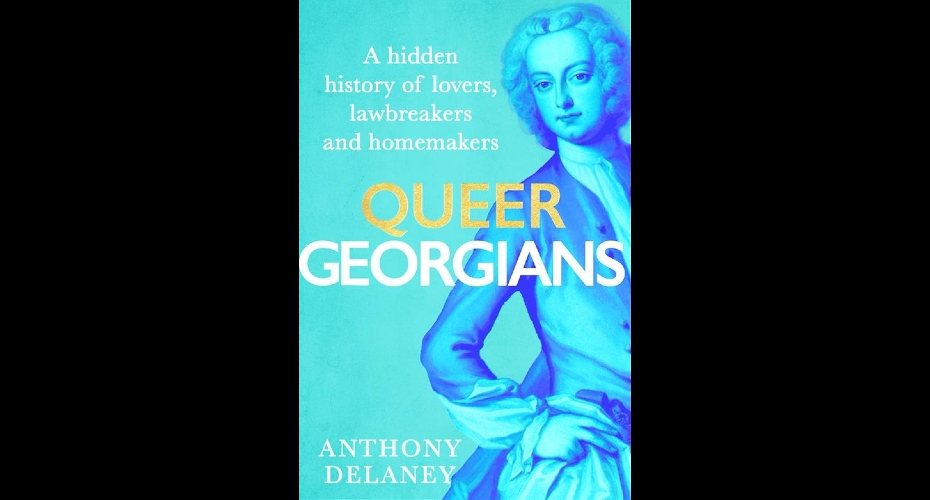An unexplained reference to a mysterious figure known as the 'cotquean' has inspired a radical new exploration of the historical roots of queer life in the 18th century.
Queer Georgians: A Hidden History of Lovers, Lawbreakers and Homemakers has unearthed archives and court records revealing how same-sex couples were 'getting married' and making homes together in the Georgian era, nearly three centuries before it was believed to have become commonplace in British and Irish society.
In so doing, the book offers the first examination of male domestic gender non-conformity, insisting on the emotional significance of the home for men.
It also presents new and sometimes very different perspectives on some of history's more celebrated queer figures, including the Chevalier d'Éon and Gentleman Jack herself, Anne Lister.
Queer Georgians has been researched and written by historian and actor Dr Anthony Delaney and is based on his PhD at the University of Exeter, which he completed in 2022. This PhD was itself inspired by another throw-away reference to same-sex homemaking that he found in a letter.
"I stumbled across an 18th-century letter from a courtier, John, Lord Hervey to Stephen Fox," said Dr Delaney, who is an Honorary Research Fellow in Exeter's Department of Archaeology and History. "The letter revealed how Hervey had been doing up a house, 31 Great Burlington Street in London, in preparation for Fox to move in. In the letter, Hervey says: "It is quite finished and looks the smuggest, sprucest, cheerfulest thing I ever saw. Nothing can improve it but a piece of moveable goods of my acquaintance [meaning Stephen], which I expect home with more impatience than I can tell you…".
"So, here is evidence that two men could make a home together, despite what we've previously been led to believe. Given that we'd completely ignored the history of the cotquean, and in light of this letter between Hervey and Fox, it made me ask: 'What other parts of the queer past have been hidden from us?'. This question led me towards the archives that would go on to inform Queer Georgians."

The book draws together a range of archival material, including life-writing, correspondence, documents from the proceedings of the Old Bailey, plays, poetry, pamphlets, travel writing, art, and newspapers. Dr Delaney consulted numerous archives, including The Holland House Papers at the British Library, as well as those at Beinecke Library at Yale; the Bodleian, Oxford; the National Archives at Kew; the national libraries of both Ireland and Wales; and the New York City Municipal Archives.
Across its three themes of 'lovers, lawbreakers and homemakers', the book re-examines queer history in the 18th and 19th centuries through some of the stories and people from the era, including Lord Hervey and the Ladies of Llangollen. It also critically reappraises key historical figures, notably the Chevalier d'Éon, who Dr Delaney says was not a 'proto trans figure' as she is so often portrayed today but, as a previously overlooked letter in his own hand reveals, a person who we would now refer to as asexual, who was forced to dress as a woman by the French Crown. Delaney also finds evidence that the real history of Anne Lister, as portrayed in the hit period drama Gentleman Jack, was far more toxic and abusive than has been addressed.
"There is a huge misconception that queer history starts at the end of the 19th century with Oscar Wilde - and it doesn't," concludes Dr Delaney. "Here we are in 1726, where the book opens, and we are seeing queer communities, queer intimacy, queer love, queer joy and resistance. I hope that, in a time when LGBTQIA+ people are increasingly under threat from regressive legislative orders and increased violence, that this book invites queer people back to their once hidden pre-modern histories and inspires us to resist and persist, joyfully, as our queer Georgian ancestors did."
Dr Delaney is a presenter on the acclaimed History Hit podcast series, After Dark, and as an actor, has worked across stage and screen, including on Fair City, Penny Dreadful and Hellboy (2019). He currently stars as Detective Jordan Macdonald in crime drama, Harry Wild.
"The Chevalier d'Éon is one of the key characters in this book, and is so often billed as a proto-trans figure; a person assigned male at birth but who lived her life as a woman because that was what she wanted to do. There is a very famous portrait of the Chevalier in the National Portrait Gallery, and her gender was a huge point of contention during her lifetime, one that even prompted a betting scandal! But during my research, I discovered that rather than living as a woman on her own terms, the Chevalier was kept under house arrest and forced to dress as a woman to discredit his authority. The 'imposition of his womanhood' was a way for the French Crown to undermine his claims for more money and discredit him.
The Chevalier was also a skilled fencer, and when he toured England and Ireland, displaying his skill, it was thought that he solely dressed as a woman when she parried, however, I have discovered that he also wore male clothing - his beloved military uniform when he fought – and this has been entirely overlooked. Based on these new revelations, my conclusion is that this is not what we would call a trans-history, but what we might now identify as asexual one - perhaps the first example of such a history by 150 years. In an addition to that, however, it is also a rollicking good story of espionage, sword-fighting, corrupt monarchs and an ever-more powerful intrusive media determined to 'solve' the issue of the Chevalier's sex, and humiliate him in the process."






